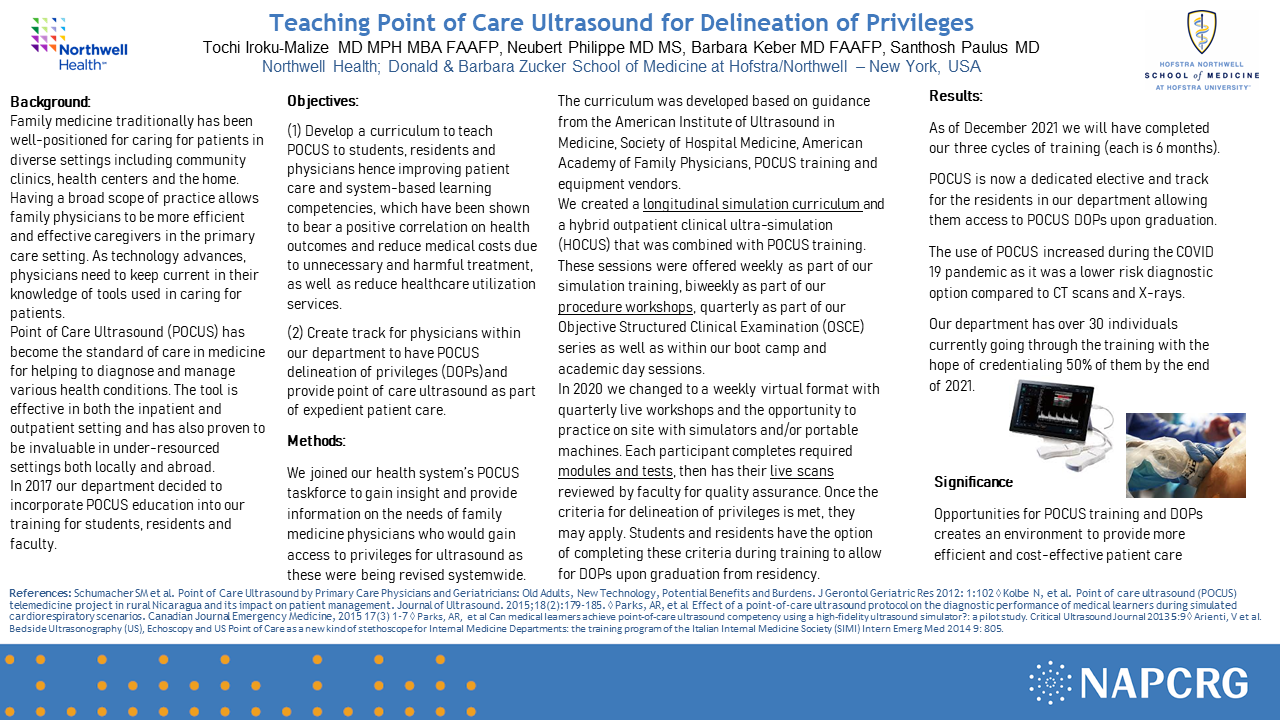PRP043: HOCUS POCUS – Teaching Point of Care Ultrasound for Delineation of Privileges
Tochi Iroku-Malize, MD, MBA, MPH, FAAFP
Abstract
Background:
Family medicine traditionally has been well-positioned for caring for patients in diverse settings including community clinics, health centers and the home. Their training incorporates developing relationships with patients and their families and caring for patients in a longitudinal manner. The skills required include communication, collaboration and relationship-building. Having a broad scope of practice allows family physicians to be more efficient and effective caregivers in the primary care setting. As technology advances, physicians need to keep current in their knowledge of tools used in caring for patients. Point of Care Ultrasound (POCUS) has become the standard of care in medicine for helping to diagnose and manage various health conditions. In 2017 our department decided to incorporate POCUS education into our training for students, residents and faculty.
Objectives:
Our overall objectives were to develop a curriculum to teach POCUS to students, residents and physicians hence improving patient care and system-based learning competencies, which have been shown to bear a positive correlation on health outcomes and reduce medical costs due to unnecessary and harmful treatment, as well as reduce healthcare utilization services. The education would lead to the physicians gaining privileges within our departments to provide point of care ultrasound as part of expedient patient care.
Methods:
We joined our health system’s POCUS taskforce to gain insight and provide information on the needs of family medicine physicians who would gain access to privileges for ultrasound as these were being revised systemwide. The curriculum was developed based on guidance from a variety of resources. Our department has created an innovative simulation curriculum which is longitudinal in nature. We further developed a hybrid outpatient clinical ultra-simulation (HOCUS) that was combined with POCUS training. The training was utilized in our community based health centers, community outreach sites, home visits, and underserved global health sites (nationally and internationally).
Results:
As of June 2021the first 2 cycles of weekly POCUS virtual sessions will be completed. POCUS is now an elective and track for residents allowing them to receive training to be eligible for POCUS DOPs upon graduation. Over 30 individuals currently training with hopes to credential 50%.
Significance:
Enhancing family physician skills is essential to providing quality care.
Family medicine traditionally has been well-positioned for caring for patients in diverse settings including community clinics, health centers and the home. Their training incorporates developing relationships with patients and their families and caring for patients in a longitudinal manner. The skills required include communication, collaboration and relationship-building. Having a broad scope of practice allows family physicians to be more efficient and effective caregivers in the primary care setting. As technology advances, physicians need to keep current in their knowledge of tools used in caring for patients. Point of Care Ultrasound (POCUS) has become the standard of care in medicine for helping to diagnose and manage various health conditions. In 2017 our department decided to incorporate POCUS education into our training for students, residents and faculty.
Objectives:
Our overall objectives were to develop a curriculum to teach POCUS to students, residents and physicians hence improving patient care and system-based learning competencies, which have been shown to bear a positive correlation on health outcomes and reduce medical costs due to unnecessary and harmful treatment, as well as reduce healthcare utilization services. The education would lead to the physicians gaining privileges within our departments to provide point of care ultrasound as part of expedient patient care.
Methods:
We joined our health system’s POCUS taskforce to gain insight and provide information on the needs of family medicine physicians who would gain access to privileges for ultrasound as these were being revised systemwide. The curriculum was developed based on guidance from a variety of resources. Our department has created an innovative simulation curriculum which is longitudinal in nature. We further developed a hybrid outpatient clinical ultra-simulation (HOCUS) that was combined with POCUS training. The training was utilized in our community based health centers, community outreach sites, home visits, and underserved global health sites (nationally and internationally).
Results:
As of June 2021the first 2 cycles of weekly POCUS virtual sessions will be completed. POCUS is now an elective and track for residents allowing them to receive training to be eligible for POCUS DOPs upon graduation. Over 30 individuals currently training with hopes to credential 50%.
Significance:
Enhancing family physician skills is essential to providing quality care.

Jack Westfall
jwestfall@aafp.org 11/21/2021point of care ultrasound is a great tool. would love to understand more about the prevalence of training and practice. hope you might email me and/or reach out to us a the Robert Graham Center.. thanks